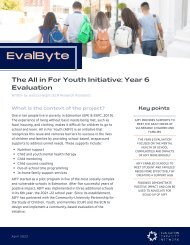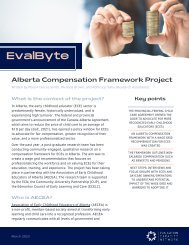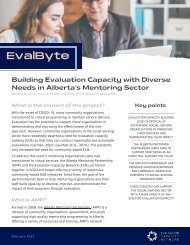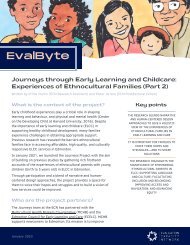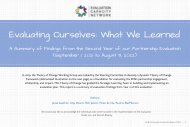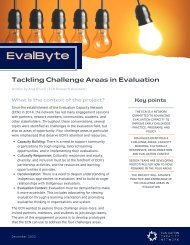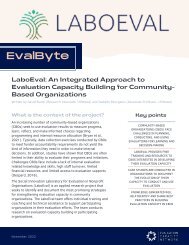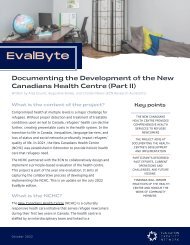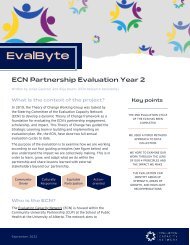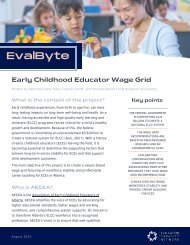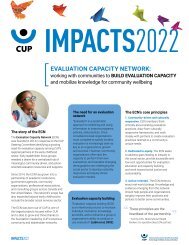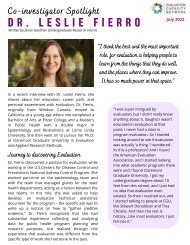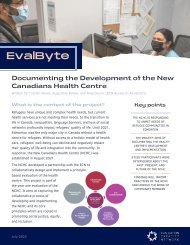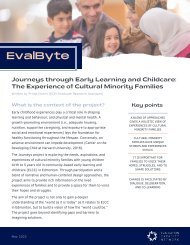EvalByte: Evaluating an Innovative Model of Experiential Co-Learning
Create successful ePaper yourself
Turn your PDF publications into a flip-book with our unique Google optimized e-Paper software.
<strong>EvalByte</strong><br />
<strong>Evaluating</strong> <strong>an</strong> <strong>Innovative</strong> <strong>Model</strong> <strong>of</strong><br />
<strong>Experiential</strong> <strong>Co</strong>-<strong>Learning</strong><br />
Written by Nicole Homick <strong>an</strong>d Leah Gavel (Mount Royal University Capstone Students)<br />
What is the context <strong>of</strong> the project?<br />
<strong>Co</strong>mmunities have expressed a need for evaluation learning<br />
opportunities that are applicable <strong>an</strong>d socially relev<strong>an</strong>t across<br />
disciplines <strong>an</strong>d sectors. Two courses have been developed <strong>an</strong>d<br />
<strong>of</strong>fered in the School <strong>of</strong> Public Health at the University <strong>of</strong><br />
Alberta to meet this need: A 13-week graduate course <strong>of</strong>fered in<br />
the fall <strong>an</strong>d UEval/QEval, a one-week intensive course <strong>of</strong>fered in<br />
the spring in collaboration with Queen’s University in Ontario.<br />
The one-week course is delivered remotely <strong>an</strong>d engages<br />
learners across C<strong>an</strong>ada <strong>an</strong>d across disciplines.<br />
The courses incorporate real-life case scenarios for students<br />
<strong>an</strong>d community partners to reflect on <strong>an</strong>d co-create evaluation<br />
pl<strong>an</strong>s, <strong>an</strong> approach called experiential learning. The use <strong>of</strong> reallife<br />
scenarios gives students <strong>an</strong>d community partners <strong>an</strong><br />
authentic view <strong>of</strong> the evaluation needs, knowledge, <strong>an</strong>d skills<br />
required to use evaluation in the community context. Upon<br />
completing the course, community partners implement the cocreated<br />
evaluation pl<strong>an</strong> in their org<strong>an</strong>izations.<br />
This project examines these experiential learning courses. It<br />
aims to 1) gain particip<strong>an</strong>ts’ perspectives on the experience <strong>of</strong><br />
co-creating <strong>an</strong> evaluation pl<strong>an</strong> <strong>an</strong>d the effectiveness <strong>of</strong><br />
experiential learning in building evaluation knowledge, skills,<br />
Key points<br />
EXPERIENTIAL LEARNING<br />
INCREASES EVALUATION<br />
CAPACITY USING REAL-LIFE<br />
CASE SCENARIOS AND<br />
PROVIDING HANDS-ON<br />
EXPERIENCE<br />
THE PROJECT AIMS TO<br />
IDENTIFY FACILITATORS<br />
AND BARRIERS TO<br />
IMPLEMENTING CO-CREATED<br />
EVALUATION PLANS<br />
STUDENTS AND KEY<br />
INFORMANTS WERE<br />
SURVEYED AND INTERVIEWED<br />
TO UNDERSTAND THEIR<br />
EXPERIENCE AND IMPROVE<br />
COURSE DESIGN<br />
THE PROJECT WILL INFORM<br />
APPROACHES TO RESPOND<br />
TO COMMUNITY EVALUATION<br />
NEEDS<br />
June 2022
<strong>an</strong>d attitudes, <strong>an</strong>d 2) foster reflection <strong>of</strong> course<br />
experience to make improvements, increase<br />
accessibility, <strong>an</strong>d identify ways to be responsive to<br />
student <strong>an</strong>d community needs <strong>an</strong>d interests.<br />
Who are the community<br />
partners?<br />
<strong>Co</strong>mmunity org<strong>an</strong>izations send a key inform<strong>an</strong>t<br />
(i.e., members from their org<strong>an</strong>ization) to work<br />
with a group <strong>of</strong> students to create <strong>an</strong> evaluation<br />
pl<strong>an</strong>. Some <strong>of</strong> the participating community partners<br />
include the Alberta Vulnerable Inf<strong>an</strong>t Response<br />
Team, Spirit North, EndPoverty Edmonton, NSTEP,<br />
the Alberta Mentoring Partnership, Skillcity<br />
Institute, <strong>an</strong>d the University <strong>of</strong> Alberta.<br />
Where is the project at?<br />
The project utilizes qualitative <strong>an</strong>d qu<strong>an</strong>titative<br />
study methods to underst<strong>an</strong>d the experiences <strong>of</strong><br />
students <strong>an</strong>d key inform<strong>an</strong>ts who participated in<br />
experiential learning through the co-creation<br />
process.<br />
A survey <strong>an</strong>d <strong>an</strong> interview guide were developed<br />
collaboratively between the ECN <strong>an</strong>d various<br />
undergraduate <strong>an</strong>d graduate students. Key<br />
inform<strong>an</strong>ts completed the survey <strong>an</strong>d participated<br />
in one-on-one interviews. A modified version <strong>of</strong> the<br />
survey was also sent out to this year’s UEval/QEval<br />
students to gain insight on the student's<br />
experience with the course.<br />
This project is currently in the data <strong>an</strong>alysis phase.<br />
A report will be created on the project findings.<br />
Why is the project<br />
me<strong>an</strong>ingful?<br />
This project will share the practical experiences<br />
<strong>of</strong> those who participated in the co-creation <strong>of</strong><br />
<strong>an</strong> evaluation pl<strong>an</strong> through <strong>an</strong> experiential<br />
learning course. It gives a platform for students’<br />
<strong>an</strong>d community partners’ voices to be heard.<br />
Particip<strong>an</strong>ts’ feedback will be used to inform the<br />
design <strong>of</strong> future courses <strong>an</strong>d make them more<br />
responsive to the particip<strong>an</strong>t's experience.<br />
Through this evaluation, evaluators aim to foster<br />
sustainable evaluation capacity through a shared<br />
learning space for undergraduate, graduate, <strong>an</strong>d<br />
community learners.<br />
<strong>Experiential</strong> learning is <strong>an</strong> innovative approach<br />
because it is not commonly used for evaluation<br />
knowledge <strong>an</strong>d skill-building. It is mutually<br />
beneficial for students <strong>an</strong>d community partners.<br />
It gives students h<strong>an</strong>ds-on experience in creating<br />
<strong>an</strong> evaluation pl<strong>an</strong> <strong>an</strong>d provides communitybased<br />
org<strong>an</strong>izations a ready-to-implement<br />
evaluation pl<strong>an</strong> – a starting point for supporting<br />
a culture <strong>of</strong> evaluation.<br />
Resources<br />
UEval: Bringing <strong>Co</strong>mmunity-Based<br />
<strong>Experiential</strong> <strong>Learning</strong> to the Evaluation<br />
Classroom<br />
Learn more about UEval <strong>an</strong>d how to<br />
participate<br />
Queen's University: <strong>Experiential</strong> <strong>Learning</strong> Hub<br />
Acknowledgment<br />
We th<strong>an</strong>k the Mount Royal University Bachelor <strong>of</strong> Child Studies students involved in this project for their contributions. We also<br />
acknowledge the continuous support provided by Rebecca Gokiert (PhD), Cristi<strong>an</strong> Neves, <strong>an</strong>d Jenae Gauthier.<br />
June 2022



